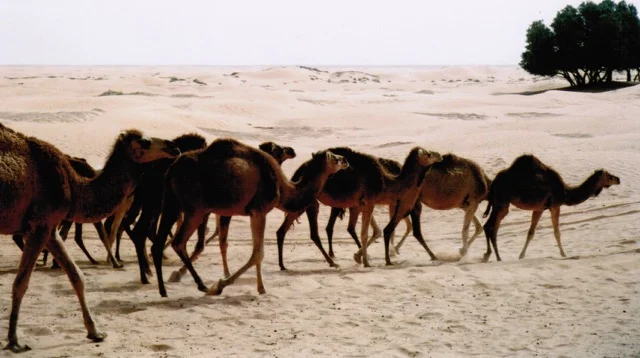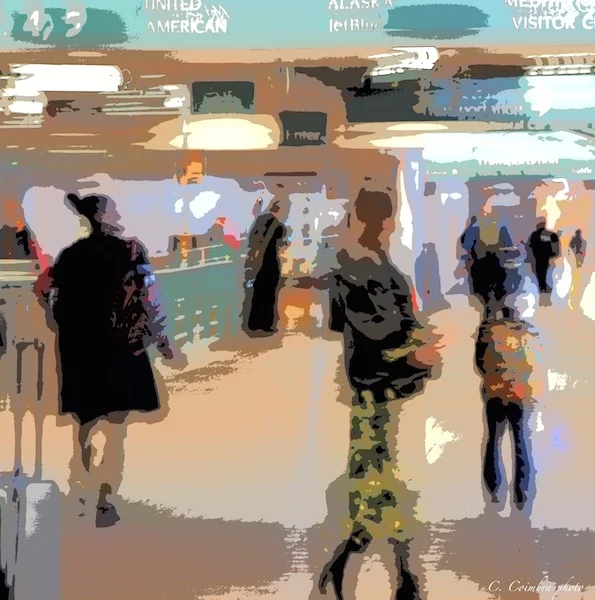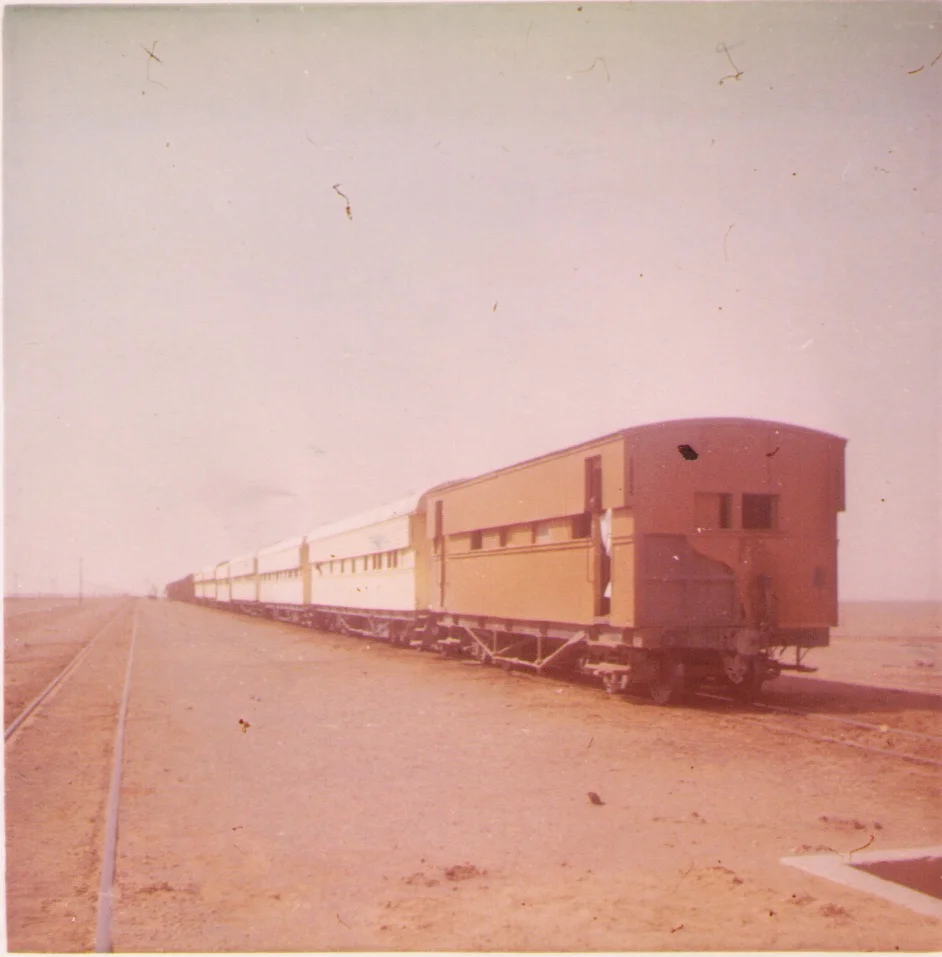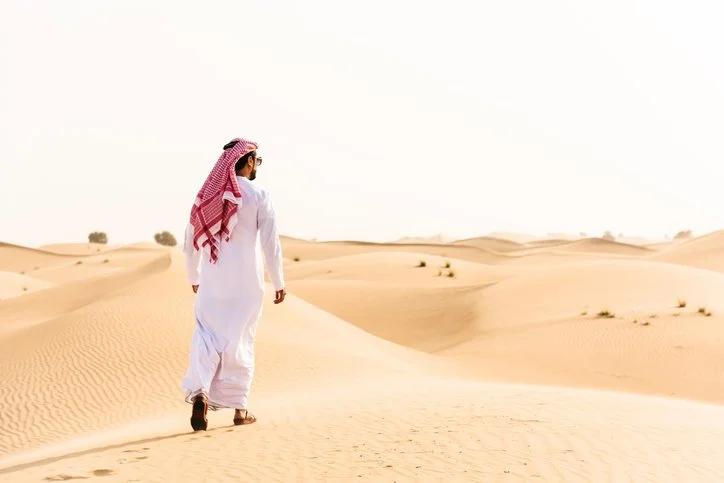Kismet On A Tunisian Dune
by Pamela Blair
In 2008, I spent two weeks in Tunisia. My guidebook described a desert oasis in western Tunisia, where I could rent a tent and sleep on the sand under thousands of palm trees. Enchanted by the book’s description, I decided to check it out. I reached the oasis at dusk, rented a tent, and quickly slept. The following morning opened with the bluest of skies, a warm, fresh breeze, and endless miles of sand, the sameness broken occasionally by groups of palm trees or a chain of camels led by a herder in a jellaba that dipped into the sand.
I walked up onto one of the dunes where a young man, Mustafa, was showing off his herd of camels to some tourists, trying to talk them into a camel ride. Short, dressed in a white jellaba, with a broad smile, dark, curly hair covered in a long red scarf, he was a sight. When he saw me, he walked over and asked my name. We started a conversation, in French.“What kind of work do you do?” he asked, more direct than I’d expected.
“A psychologist,” I replied.
“Oh, a psychologist! Well, come with me. I have something I need to talk to you about.”
And, forgetting his potential camel-riding customers, he grabbed my hand and led me to a nearby dune. We sat cross-legged on the sand, the sun beating down on us, a caravan of camels sauntering in the distance. Solemnly, he began his story.
“When I was twelve, I fell in love with Zainab, and she with me. We loved each other so much! We planned to get married, although we didn’t know how we would manage it, as marriages are arranged by parents in our village. One day we managed to meet, and made a vow that, even if our parents wouldn’t allow our marriage, we would refuse to marry anyone else. But Zainab’s parents wouldn’t let me marry her! And they haven’t let me see her since she was 15, five years ago.
”What could I say to this young man? “Oh, that must be terrible for you! Do you know what's happened to her since then?”
“No! And that’s what drives me crazy!” He was close to tears by now. “I don’t know if she’s broken our vow and has married someone else or if she still dreams of me, as I do of her.”
“Do you know why her parents wouldn’t allow you to marry her?”
“I think it’s because they wanted her to marry one of her cousins, who is rich. But I have been working very hard with my camels, and I am saving money so that I can buy even more camels. Now I am also rich.” His voice rose with pride.
“What does your family think about this?”
“My father says he’ll support me if I take her to run away with me. But I don’t even know where she is, or if she will do it!”
“Is there anyone you know who can find this out?”
“I have a friend who might be able to see her. He used to live near her. He also supports me and hopes we can marry.”
“Do you know anyone else who could help you?”
“No, my friend is the only one I can think of.”
I’d run out of questions. What could I tell this poor boy? If Zainab was now 20, it was likely she was already married, and Mustafa was holding on to an empty dream. I didn’t want to be the one who destroyed that dream, but I knew I’d probably have to, in the softest way I could think of. I thought and thought. Then I remembered a Broadway show I’d seen, Kismet, a word which meant destiny, or fate, in Arabic. It gave me an idea.
“Do you believe in destiny?”
“Of course I do. I’m a good Muslim.”
Great! I’d found a way in.
“Then here is what I suggest. You do everything possible to find out if Zainab is still waiting for you. Maybe your friend can help you with that. If she is still unmarried, find a way to ask her if she will run away with you. Maybe your friend can help with that too. If she is willing, you make your plan, and you run away with her. As you said, your father will help with that. But if she is not willing, or if she is already married, you accept that Zainab is not the woman you are destined to marry. It may be very hard to accept this, but destiny is stronger than any man’s or woman’s feelings, and in the end it is what you must do. And, if it is truly destiny that you not marry Zainab, then there is some woman, destined to marry you, who is waiting for you to let go of your dream to marry Zainab. You must find her, and know that in the end you will be happier with her than you would have been with Zainab.”
“Oh...yes, I see...that is what I have needed to hear! Thank you! Thank you!”
Smiling, Mustafa rose and held out his hand to help me up from the cushiony dune.
“Now I must get back to my camels! Thank you so much!”
He shook my hand, turned and ran off. I stood, watching him hurry back to his herd. I walked back to the campground, dazed. Had that encounter really happened? Had I actually been able to give advice to a young Tunisian, on a desert sand dune? The chance to have such an intimate conversation with a Tunisian overwhelmed me with awe and delight. Maybe it was our destiny to meet, and to have that serendipitous therapy session in the Tunisian desert. Although I had no idea if there was such a thing as kismet, it made as much sense as anything.
Pamela Blair is a 76-year-old retired psychologist who, in her early thirties, dropped out of a career to take a three-year trip, traveling overland through Europe, the Middle East and Africa. This trip and the people she met along the way have radically changed her outlook on the world and the people in it. You can read more of her travel stories on her website at https://pamelabsite.wordpress.com.




